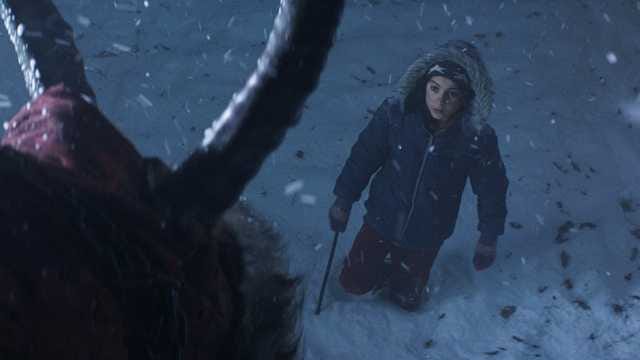Traditional Christmas Movies Bonus: Krampus
I’m dreaming of a White Christmas…
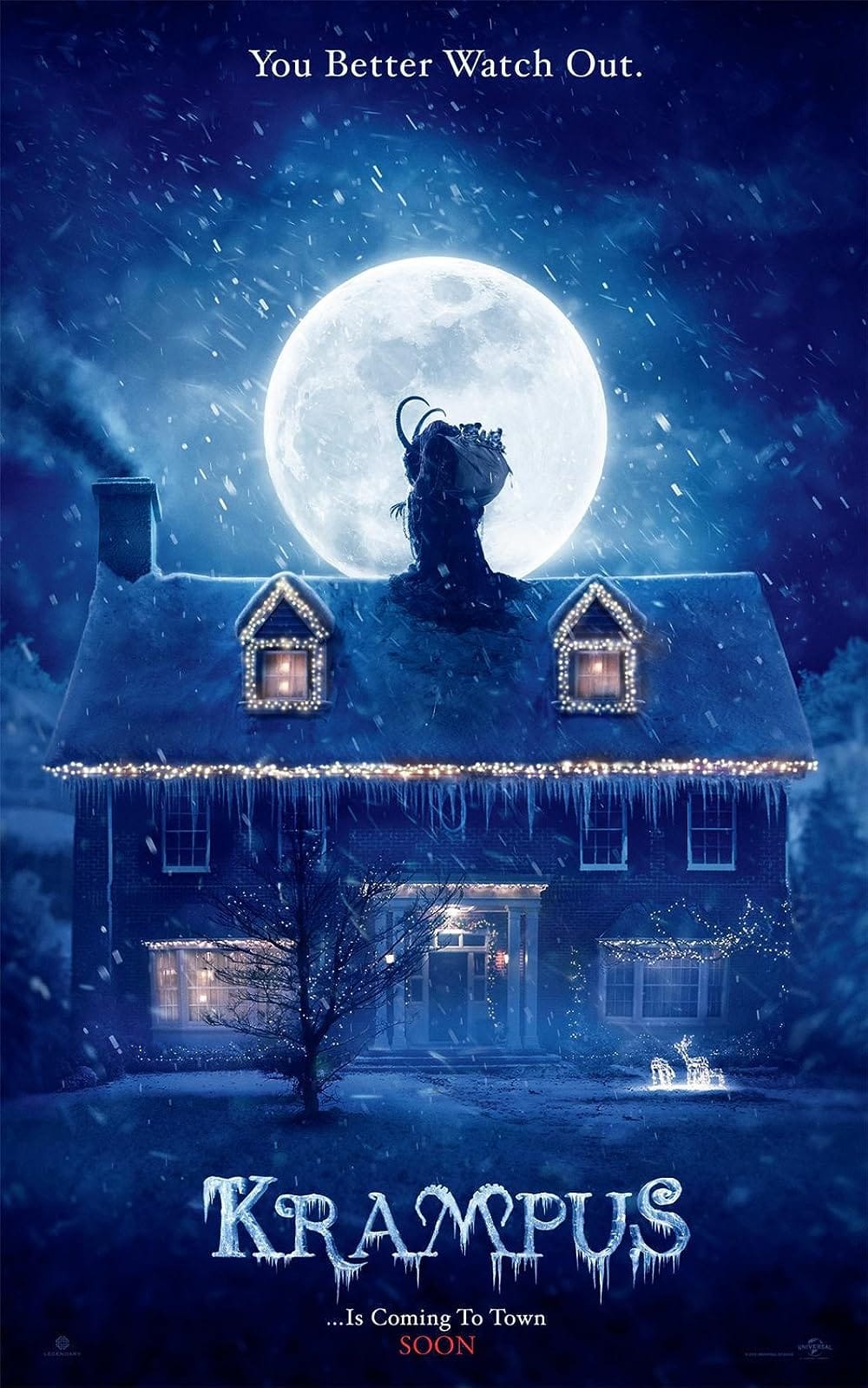
It’s still kind of Christmas, and when dysfunctional family squabbling causes young Max to lose his festive spirit, it summons a horned creature from ancient European folklore, Krampus, who comes to punish naughty children at Christmastime. Snowed in, and besieged by monsters and nightmares, the family must band together in order to save one another from a monstrous fate.
Christmastime means Christmas films, and here are some of my favorites! Yes, Christmas may be over, but I couldn’t have a list of traditional Christmas movies without including this tale of traditional dysfunction, this commentary on complicity, this shrewd skewering of the American holidays, all wrapped up in a festive Twilight Zone-esque delivering of well-deserved justice.
Released in 2015, Krampus opens with a familiar scene of rabid Christmas shoppers rioting in a department store, trampling employees and each other, faces twisted into rictuses of smiling rage, driven by a love of hurting others and the thrill of possessing something that others envy, in a furious flurry of fisticuffs as they scramble for plastic geegaws and colorful garbage, set to Bing Crosby’s It’s Beginning To Look A Lot Like Christmas. It’s a brutally honest depiction of Christmas, a gaudy, selfish affair of false niceties, rampant consumerism, and a forced public acknowledgement of the central myths of Christianity, something White Christian America would go apoplectic over if any other religion attempted the same.
Krampus tells the story of a “traditional” family Christmas in White America, the kind you see every year, which means spending time with people that you normally wouldn’t even talk to if you weren’t related to them. This is what Tom and Sarah, their two children, Max and Beth, and Grandma, are facing as their idiot asshole MAGA fuckhole family members arrive to “enjoy” the holidays with them.
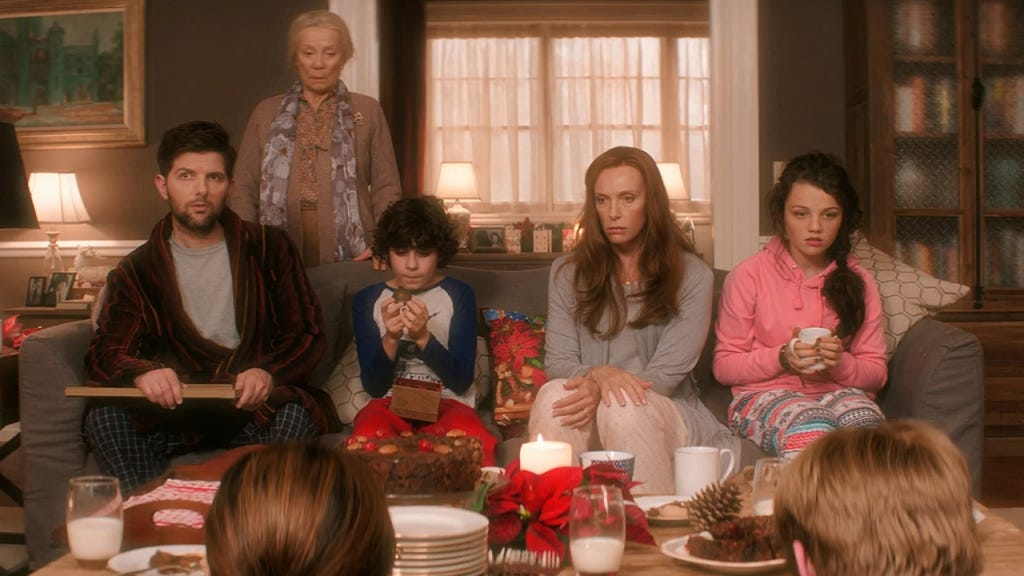
This crappy holiday is the capper to a disappointing year for the family, as recently, their relationships have begun to fray. Sarah is struggling to hold her family together, scrambling to be the perfect Mom. Tom isn’t present, too focused on work. Sister Beth only wants to ditch the festivities, get high, and fuck her boyfriend. Meanwhile, their Grandma, Ms. Teutonic 1929, only speaks in German, and has a worried expression, a cloud that comes over her, almost as if she has some kind of… dark… memories when it comes to Christmas. Young Max suffers quietly through all of this, wanting more than anything for his family to go back to the way they used to be, tormented by memories of the good times they used to have.
But on the upside… he still believes in Santa.
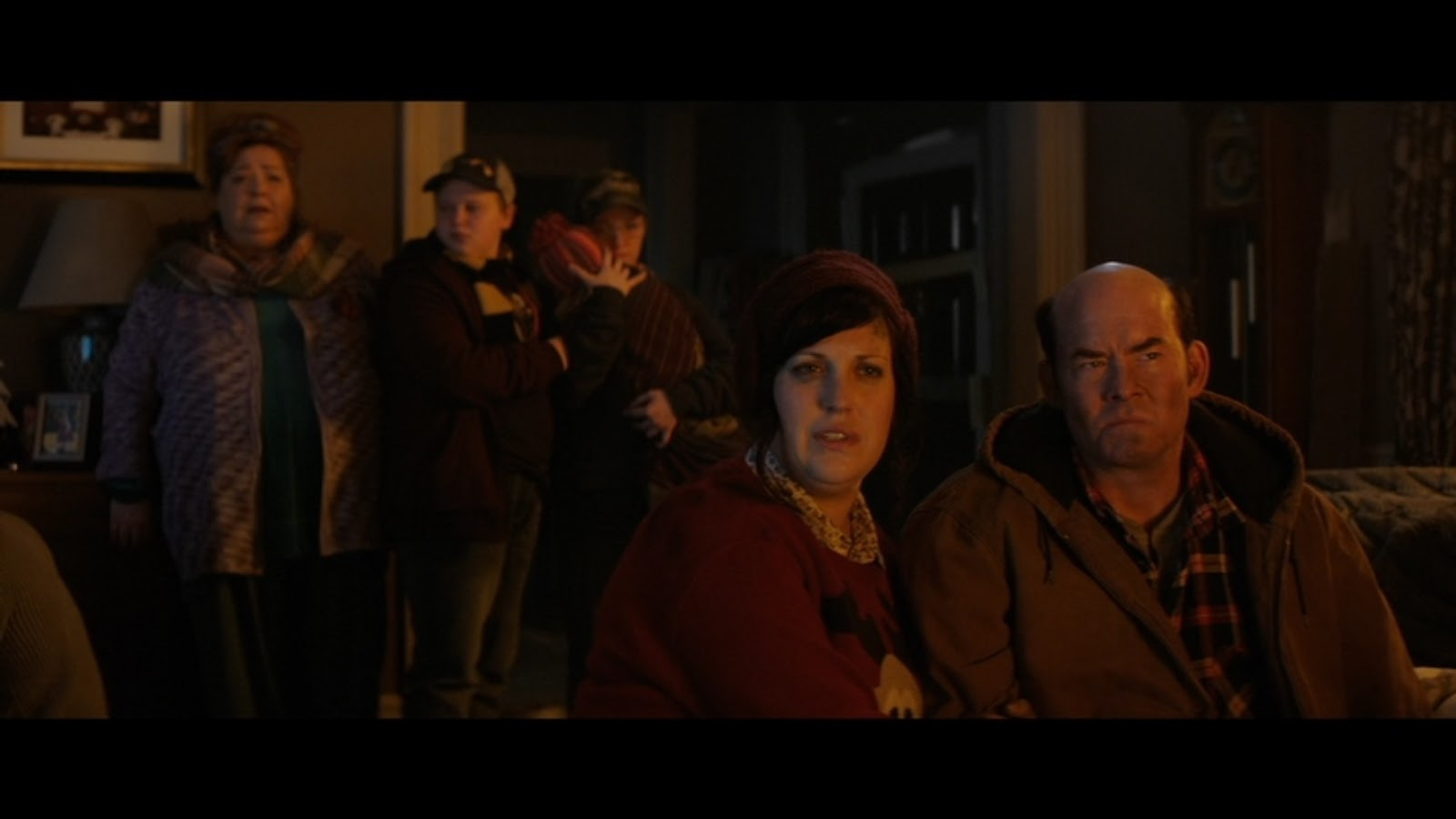
Despite being guests in Tom and Sarah’s house, the barely sentient rube relatives proceed to shit on everything and anything, making demands at every turn, offering their idiot asshole bigot opinions at every other turn, and sneeringly disapproving of anything unfamiliar, because they’re ugly simpletons, small in mind, narrow of opinion, and poor of taste.
They’re ugly and they suck, to put it simply.
Max in particular gets an endless amount of shit from his cousins, not just because he’s sweet and sensitive and cares about others, but also because he still believes in Santa. But he is restrained from defending himself, restrained from beating the ever-loving fuck out of his shitty family members by his sister, mother, and father, because they prefer to take the “high road” of silent complicity, because they want to enjoy a “nice” family holiday, which is the real holiday tradition in White America. Tensions rise over dinner, and when it all finally erupts in violence, it is perhaps the only time these people have ever been honest with each other.
Pushed to his limit in the aftermath, Max tears up his letter to Santa, inadvertently summoning the monster known as Krampus.
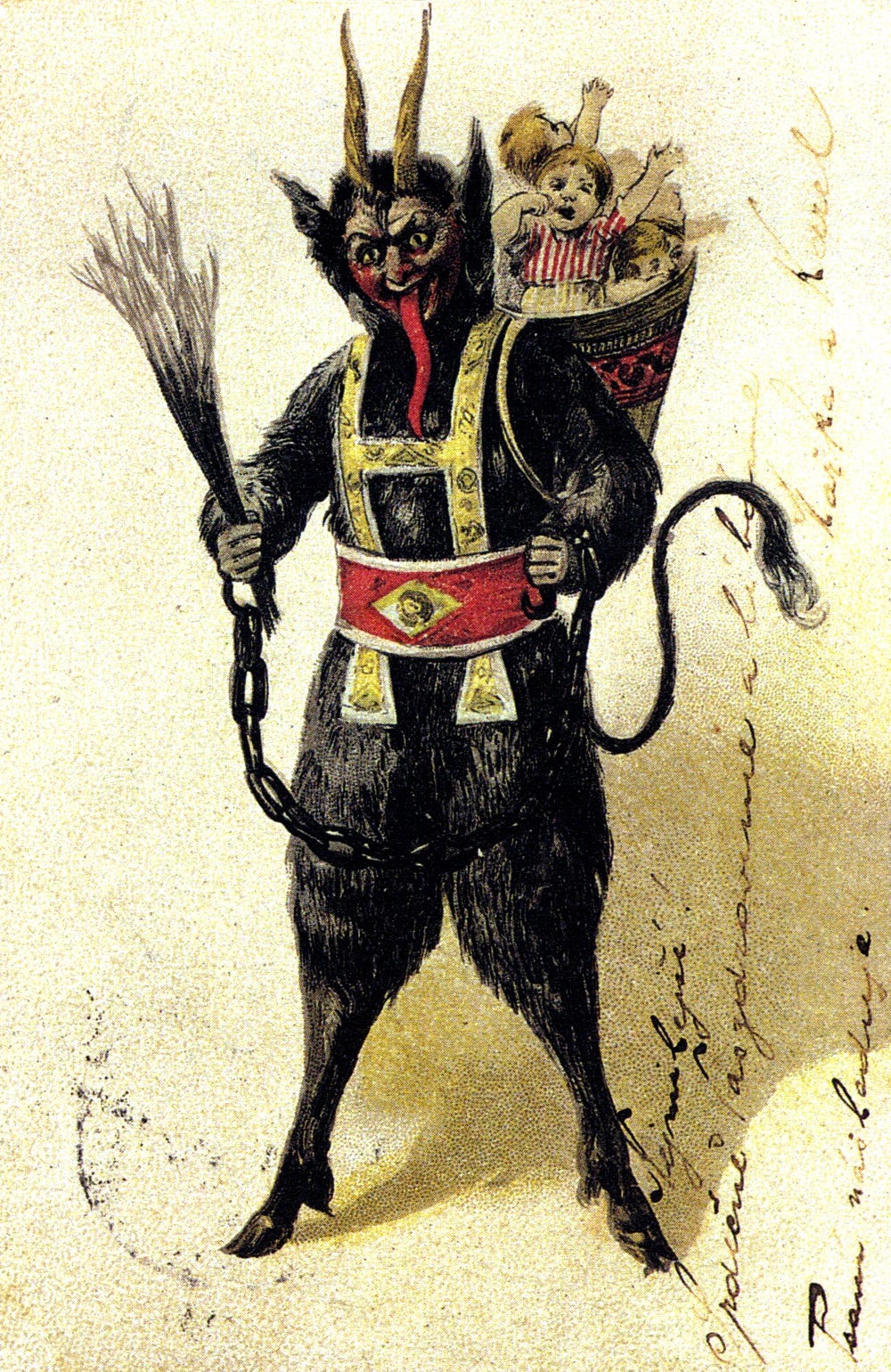
In the past few years, the idea of Krampus is one of those things that’s caught on among hipsters, experiencing a resurgence of popularity in a performative way, like, they can’t wait to wear a Krampus sweater to Christmas dinner and then explain it to their Grandmother.
Y’know, real “Let’s go get sushi and not pay” shit.
Krampus is a figure from Central and Northern European folklore. He’s usually presented as a half-goat, half-demon monster, whose name is possibly derived from words meaning “dead” or “rotten” or “claw” maybe. His role is to punish those who misbehave. Obviously, Christian colonizers based their own devil figure at least partially off Krampus.
Santa Claus’ dark half, he and Krampus visit children together. Santa rewards the good ones, and Krampus punishes the naughty ones. He’s fanged, usually dark and hairy, with cloven hooves, horns, and a long pointed tongue that lolls out. He carries chains that are sometimes hung with bells, and birch switches too. He also sometimes has a sack or a basket on his back, in which he would stuff naughty children, and then carry them off. The idea that naughty children are carried off is something other Santa companions often share too, figures like Zwart Piet, which is a super racist character still celebrated in Europe, and fiercely defended too, especially in the Netherlands, where they loooooove to dress up like him, because, y’know… white people.
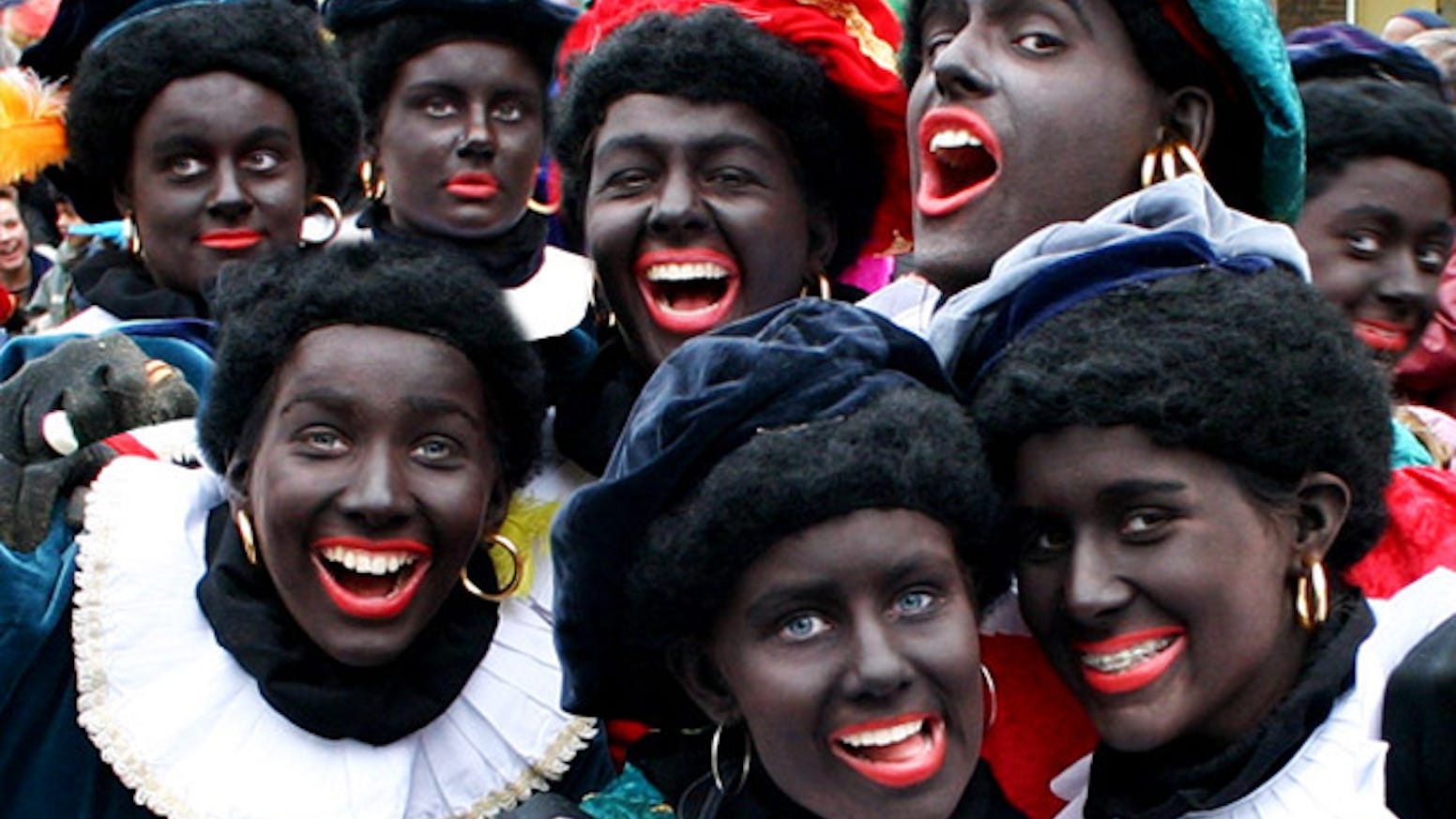
Anyway…
When Max accidentally summons Krampus, it starts with a blizzard that is more akin to a Winter Apocalypse than a snowstorm. It kills their power, and strange snowman start appearing in their front yard. Also, a weird sack filled with mysterious packages arrives on the front steps.
Of course, they bring the sack inside the house.
When Krampus finally arrives, he’s awesome. He’s a massive, hunched, hairy, and cloven-hoofed creature, the obvious dark shadow of Saint Nicholas. He snorts like an angry bull. His chains rattle as he leaps across the neighborhood rooftops, making the whole house shudder and shake.
He brings with some demonic Christmas cheer too—fantastically designed monsters that are both hilarious and also terrifying—that make quick work of the deserving and the non-believers. You better watch out, indeed. The neighborhood is quickly gutted, with only the wrecked houses, half-buried in snow and crusted in ice, left behind. The family is soon trapped in their home, under siege from Krampus and his helpers, but as long as they can keep their fire hot, they’re safe.
Unfortunately, the big talking MAGA dipshit falls asleep on Fire Watch, and the walls of their little familial fort are breached…
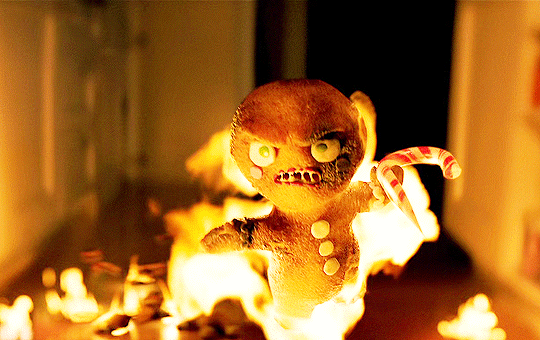
Seriously, the monsters are really great, especially—obviously—the killer gingerbread men. Also, there’s a really great animated sequence that tells the story of Grandma’s previous encounter with Krampus that does an excellent job of being a dark echo of those old Rudolph and Frosty claymation cartoons too.
But the central idea of the film, that we’re all the same when the chips are down, is one of those things that is true, but also, in these kinds of context, as the theme of a genre movie, it’s usually preached by people who are standing on the safe side of a power imbalance. Meaning, it’s usually a white person making this point, someone with the privilege to be able to make excuses and allowances for the Nazis, monsters, and assholes in their lives, because these are usually people they’ve known all their lives, who also never target them directly with their hatred. “They’re nice to me!” they say. “They’re otherwise good people.” Whenever you hear someone saying something like this, it’s most often in specific defense of those Nazis, monsters, and assholes in their own lives, and probably also because they’re either about to head home for the holidays, or they just got back.
The implication that it’s the Max’s fault, for having had enough of dealing with these people and daring to push back, is the real insidious asshole aspect of the whole deal. That’s the meat of the whole thing. The idea is, yes, these people are awful, they’re regularly mean to you and the world. Yes, they are people that you would otherwise refuse to spend time with if you weren’t related to them, but hey… they’re family.
So it’s on you to accept who they are, and to see beyond it.
You’re the one who needs to be “better.” You’re the one who needs to “understand.” You’re the one who needs to compromise your ideals, your beliefs, your standards, your whole being, and by “compromise,” they mean “throw all that shit away.” You are expected to be gracious, to be happy, eager even, to spend holidays and vacations with them, to sit silently by as they say awful things, and to never forget that you agreed to a “no politics” rule for this gathering—a rule that always only seems to apply one way—and that, should you do anything less than this, you would “ruin” Christmas.
This is the deal that so much of White America seems to agree to, and Krampus shows up after Max tears up his letter to Santa, this is saying that everything that happens afterwards is actually Max’s fault, and by extension, it’s your fault too. That is, if you’re also not one of the antisemitic bigots, homophobes, transphobes, and/or islamaphobes in your families. This is meant to remind you that, if you do anything other than acquiesce to the wishes of these awful people, you’ll ruin everything.
You’ll lose your family.
Which is Max’s threatened punishment in the film. This is the thing White America fears the most too, to be cast out, ostracized by their own. Avoiding being “othered” by their fellow white people is their primary motivation in all things these days…
Don’t upset Uncle MAGA Dan, or Cousin KKK Frank, or Grandpa Hitler, or My brother the Proud Boy, or my little cousin, Andrew Tate jr., or my Aunt Shiela Anne Greene, the local Moms 4 Liberty chair, or My Mother the Rabid Anti-vaxxer, or My Father the antisemitic Qanon Nut in the tinfoil hat, because if you do, then we won’t have a “nice” family Christmas. Max, as White America, believes that the only way he can save his family is to sacrifice himself… Which is the spirit of Christmas, after all, at least according to the film, “the sacrifice of giving.” Meaning, the giving of yourself, of who you are, of what you believe in.
And the point of the movie is that this whole belief is bullshit.
Krampus is actually about how the practice of silently enduring the toxic bullshit of your family, instead of confronting and condemning, all for the sake of not upsetting the holiday, means you are a coward. It also means that most American “traditions” are shallow bullshit, created by the Church in an effort of cultural assimilation, or by Department Store owners in the 1950s who were looking to boost sales… although, to be fair, this second part might just be my own additionally tacked-on interpretation.
Anyway…
Krampus really is a great little film, a straight-up Christmas horror that is more thrilling than gory, and its frights are more of the fun jump-scare variety. It looks great, and the cast is great too. Most of all, I really love how funny and mean and honest this movie is.
I especially love how Max—once he decides to “selflessly” surrender himself instead of accepting the truth, instead of getting the hint and venturing out into the unknown to find his own way, to find people who will actually love him, and treat him as such, and all for nothing more than to have a “nice Christmas the way it used to be,”—in the end, gets exactly what he asks for, and exactly what he deserves… forever.
Fantastic.
Merry fucking Christmas.
